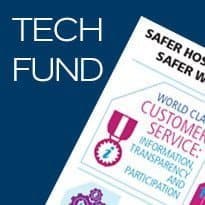Fourteen trusts received more than £3m in funding from the first round of NHS England’s technology fund, which distributed just under £182m in total.
NHS England has today published a list of the 131 NHS trusts that were successful in their bids for the ‘Safer Hospitals, Safer Wards Technology Fund’, which shows that a small number of trusts won significant amounts for electronic patient record projects.
Four trusts received more than £7m. Nottingham University Hospitals NHS Trust was successful in two bids, one for electronic clinical noting, and the other for digitised health records, bringing its total funding up to £8.2m; the most received by any one trust.
Leeds Teaching Hospitals NHS Trust received a total of £7.7m for its integrated digital health record programme and an e-prescribing project, and Guy’s and St Thomas’ NHS Trust won £7.1m in total for two projects: £4m for e-noting and £3.1 for e-prescribing.
North Tees and Hartlepool NHS Foundation Trust, which recently announced it has chosen to implement InterSystems’ EPR, making it the company’s first major English EPR site, has received more than £7.1m to deploy the system.
In total, nearly a quarter of the funding has gone to trusts which are implementing EPR systems: there are 22 EPR projects funded by a total of £38.6m.
Other striking trusts to receive EPR funding include Cambridge University Hospitals NHS Foundation Trust, which won £3.5m for its eHospital project, which is using Epic, and Papworth Hospital NHS Foundation Trust, which won £4.3m to join eHospital.
The tech fund was launched to support health secretary Jeremy Hunt’s call for a ‘paperless’ NHS by 2018. When the first £260m of funding was announced in May last year, it was billed as being for e-prescribing and other patient safety initiatives.
The ‘Safer Hospitals, Safer Wards: Achieving an integrated digital care record’ guidance issued at the start of July last year expanded this to include document management, scheduling and bedside observations, and also put an additional focus on information sharing across healthcare communities.
Today’s focus on EPR projects, many of which are unfinished business from the National Programme for IT, or responses to it, are therefore something of a surprise. Despite this, some of the original areas of focus for the fund have also received funding.
The biggest single number of projects funded are e-prescribing projects; some 40 appear to have been funded, including three specialist cancer e-prescribing implementations.
Around 18 clinical noting, nursing observations, or vital signs projects have also been funded, and around 15 electronic document management projects.
The second round of the tech fund, which will release £240m over the next two years, has just opened for bidding. Its focus is on trusts at the lower levels of digital maturity, as captured by EHI Intelligence’s Clinical Digital Maturity Index, on integrated care projects, and on e-prescribing again.
Suppliers have told EHI that some 30 trusts probably failed to win money for e-prescribing projects in the first tech fund round, and that they expect them to be successful this time around, leading to around 80 projects being funded in total, when new applications are also counted in.
The second round of the tech fund says, explicitly, that trusts can only put in one bid this time – plus one joint bid for an information sharing project – and that programmes being funded in other ways, such as through the remains of the National Programme for IT, will not be eligible.
Trusts must, in all cases, find matching funding, and deliver on Treasury demands for a significant return on investment. The list of projects released today confirms that around £60m of the first round was not distributed.
EHI understands this is because of the tight timescales imposed for bidding and spending any money awarded through the ‘Safer Hospitals, Safer Wards’ fund, and the RoI demands, which some trusts were unable to meet in their business cases.
The smallest sum of money to be recieved by a trust appears to be £19,440, which was won by South West Yorkshire Partnership NHS Foundation Trust for a SystmOne deployment.
Other small projects include order communications for sexual health and maternity services at West Middlesex University Hopsital NHS Trust, which won around £25,000 for each project, and a pre-assessment project at Queen Victorial Hospital NHS Foundation Trust, which also won £25,000.

